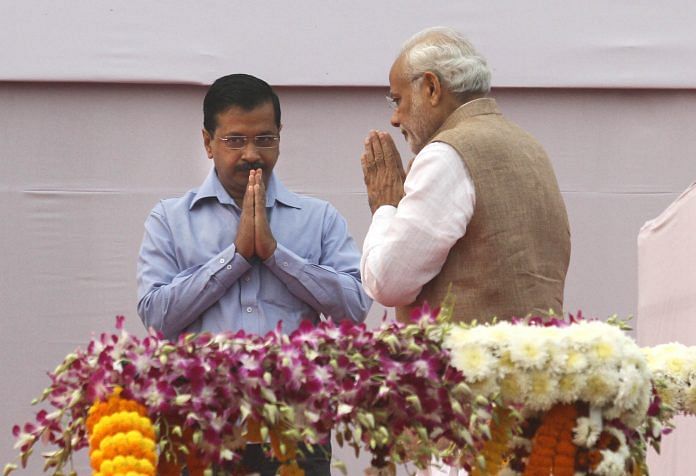The bench makes it clear that in a democracy “there is no room for absolutism” and, more importantly, “there is no space for anarchy”.
Is the judgment of the Constitution bench of the Supreme Court in the Arvind Kejriwal government versus Delhi L-G case a big victory for the Aam Aadmi Party (AAP) and a loss of face for Modi government?
Yes.
Will democratically elected Kejriwal finally get back to governance and stop playing the victim?
Maybe, if Kejriwal understands that running the government and being an anarchist don’t go together.
And, will the SC judgment ensure that the L-G will now give a free hand to the AAP government to run Delhi as per the latter’s whims and fancies?
Maybe. The majority judgment, however, doesn’t clarify which issues he can refer to the President.
FULL TEXT: The Supreme Court judgment in Arvind Kejriwal Vs Centre power struggle
In sum and substance, all that the Supreme Court has done today is:
1) Reiterate the already stated Constitutional status of Delhi
2) Tell the L-G that he can’t obstruct each and every decision that the Delhi government takes
3) Send out a clear message to Modi (that it is not the centre’s job to destablise state governments) and Kejriwal (governments can’t be anarchist).
In what is a sharp rap on the knuckles for the L-G, the court has told him to stop being an “obstructionist”.
“If a well- deliberated legitimate decision of the Council of Ministers is not given effect due to an attitude to differ on the part of the L-G, then the concept of collective responsibility would stand negated,” says the majority judgment penned by Chief Justice Dipak Misra.
On the issue of the L-G referring decisions taken by the Delhi government to President, the SC judgment is categorical: L-G can do so but not in every case. Such a step has to be an exception and not the rule, the SC said.
The words “any matter” employed in the proviso to clause (4) of Article 239AA cannot be inferred to mean “every matter”.
“The power of the L-G under the said proviso represents the exception and not the general rule, which has to be exercised in exceptional circumstances by the L-G, keeping in mind the standards of constitutional trust and morality, the principle of collaborative federalism and constitutional balance, the concept of constitutional governance and objectivity, and the nurtured and cultivated idea of respect for a representative government,” says the judgment.
It then tells the L-G that he “should not act in a mechanical manner without due application of mind so as to refer every decision of the Council of Ministers to the President”.
In his concurring judgment, Justice D.Y. Chandrachud also underlines the fact that the power of the L-G is wider than the power of the governor of a state.
But, he also notes that in discharging his constitutional role, the L-G has to be conscious of the fact that the “Council of Ministers, which tenders aid and advice, is elected to serve the people and represents both the aspirations and responsibilities of democracy”.
“Neither the Constitution nor the enabling legislation, which we have noticed earlier, contemplate that every decision of the executive government must receive the prior concurrence of the L-G before it can be implemented,” he points out.
Even Justice Ashok Bhushan, who gave a separate concurring judgment, has also said that the “purpose of communication is not to obtain concurrence of L-G”.
More importantly, the SC has also clarified that the provision in the rules that make it mandatory for the Delhi council of ministers to communicate all its decision to the L-G can’t be translated to mean that the concurrence of the L-G is required.
For the Modi government (the judgment doesn’t name it but refers to the centre), the judgment has this advice, and perhaps a warning: “The Constitution has mandated a federal balance wherein independence of a certain required degree is assured to the state governments. As opposed to centralism, a balanced federal structure mandates that the Union does not usurp all powers and the states enjoy freedom without any unsolicited interference from the central government with respect to matters which exclusively fall within their domain.”
This is a message that Prime Minister Narendra Modi, who rode to power on the promise of federalism, would do well to remember while dealing with state governments, especially those ruled by the opposition.
When the judgment talks of “discussion, deliberation and dialogue”, the message is that both Kejriwal and the L-G (centre) may differ but the same must be “based on principle and supported by cogent reasons”, with the primary effort “to arrive at a solution”.
At the same time, the bench also makes it clear that in a democracy “there is no room for absolutism” and, more importantly, “there is no space for anarchy”.
Kejriwal, who once claimed that he “an anarchist”, would do well to read this part of the judgment.
Hope all three – L-G, Modi and Kejriwal – understand the real import of the judgment.



